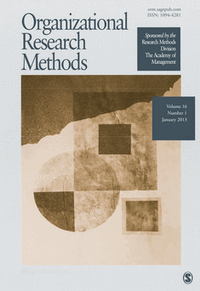Not a Silver Bullet: PLS and Management Research
Editor’s note: We are pleased to welcome Mikko Rönkkö of Aalto University and Joerg Evermann of Memorial University of Newfoundland, whose paper “A Critical Examination of Common Beliefs About Partial Least Squares Path Modeling” is forthcoming in Organizational Research Methods and now available in the journal’s OnlineFirst section.
 Partial Least Squares path modeling (PLS) is peculiar among statistical methods. At the same time, it is popular in some management and organizational research disciplines, but almost nonexistent in others. The method also stands out in the research methods literature. While other statistical methods are constantly analyzed in specialized journals, it is difficult to find any papers about PLS in the mainstream social sciences research methods journals.
Partial Least Squares path modeling (PLS) is peculiar among statistical methods. At the same time, it is popular in some management and organizational research disciplines, but almost nonexistent in others. The method also stands out in the research methods literature. While other statistical methods are constantly analyzed in specialized journals, it is difficult to find any papers about PLS in the mainstream social sciences research methods journals.
Further, most of the introductory texts on statistical methods ignore the method. Instead its users rely on introductory articles in applied journals. Most of these present PLS as a structural equation modeling method and argue that it can provide advantages over earlier methods and other structural equation modeling methods. However, many of these papers lack any link to original methodological papers while others contradict each other and the original works that developed PLS, giving the reader an incomplete and possibly confusing picture of the method.
 In our paper, we review how the PLS method has been applied in leading management journals. Based on this review, we identify six frequently repeated beliefs about PLS:
In our paper, we review how the PLS method has been applied in leading management journals. Based on this review, we identify six frequently repeated beliefs about PLS:
1. PLS has advantages over traditional methods because it is an SEM estimator
2. PLS reduces the effect of measurement error
3. PLS can be used to validate measurement models
4. PLS can be used for testing null hypotheses about path coefficients
5. PLS has minimal requirements on sample size
6. PLS is most appropriate for exploratory or early stage research
We trace the citations to the origins of these beliefs and present what evidence – if any – has been presented to support these beliefs. Our analysis suggests that many of the beliefs can be traced back to article small number of articles in the marketing discipline where they are presented mostly without evidence. We analyze each belief and discuss why contemporary understanding of statistics leads us to conclude that these beliefs are invalid. We use a simple example model to illustrate this. We conclude that the use of PLS for statistical inference is not justified. The method may be useful for statistical prediction, which it was initially intended for, but our review of the existing studies did not find any such applications.
This paper is not intended as the end to the discussion about PLS. Instead, we wish to pursue two goals: First, to raise the awareness of lack of evidence for the usefulness of the method among its users and reviewers encountering PLS-based studies. Second, to show that there is an urgent need for more attention toward the method in the mainstream social sciences research methods literature to better understand its strengths and weaknesses.
Read “A Critical Examination of Common Beliefs About Partial Least Squares Path Modeling” in Organizational Research Methods.
Mikko Rönkkö is a doctoral candidate at Aalto University, School of Science. His research interests are in statistics and research methods, with a focus on structural equation modeling.
Joerg Evermann is an associate professor of information systems. His research interests are in statistics and research methods, with a focus on structural equation modeling.
































































































